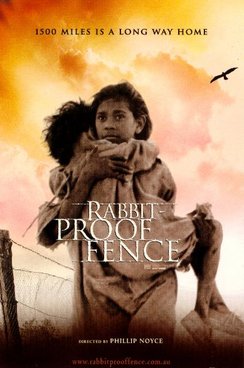
Rabbit-Proof Fence is a 2002 Australian drama film directed and produced by Phillip Noyce based on the 1996 book Follow the Rabbit-Proof Fence by Doris Pilkington Garimara. It is loosely based on a true story concerning the author's mother Molly Craig, aunt Daisy Kadibil and cousin Gracie, who escaped from the Moore River Native Settlement, north of Perth, Western Australia, to return to their Aboriginal families, after being placed there in 1931. The film follows the Aboriginal girls as they walk for nine weeks along 1,500 miles (2,400 km) of the Australian rabbit-proof fence to return to their community at Jigalong, while being pursued by white law enforcement authorities and an Aboriginal tracker. The film illustrates the official child removal policy that existed in Australia between approximately 1905 and 1967. Its victims now are called the "Stolen Generations".

Jerome Leon Bruckheimer is an American film and television producer. He has been active in the genres of action, drama, comedy, fantasy, horror and science fiction. After working in advertising out of college, Bruckheimer moved into film production in the 1970s. In the 1980s and 1990s, he partnered with fellow producer Don Simpson. Bruckheimer and Simpson's partnership continued until Simpson's death in 1996. Bruckheimer has produced films including Flashdance, The Rock, Crimson Tide, Con Air, Armageddon, Enemy of the State, Pearl Harbor, Black Hawk Down, and Kangaroo Jack, as well as the Beverly Hills Cop, Top Gun, Bad Boys, Pirates of the Caribbean, and National Treasure franchises.
Indigenous music of Canada encompasses a wide variety of musical genres created by Aboriginal Canadians. Before European settlers came to what is now Canada, the region was occupied by many First Nations, including the West Coast Salish and Haida, the centrally located Iroquois, Blackfoot and Huron, the Dene to the North, and the Innu and Mi'kmaq in the East and the Cree in the North. Each of the indigenous communities had their own unique musical traditions. Chanting – singing is widely popular and most use a variety of musical instruments.

The 69th Academy Awards ceremony, organized by the Academy of Motion Picture Arts and Sciences (AMPAS) took place on March 24, 1997, at the Shrine Auditorium in Los Angeles beginning at 6:00 p.m. PST / 9:00 p.m. EST. During the ceremony, AMPAS presented the Academy Awards in 24 categories honoring films released in 1996. The ceremony, televised in the United States by ABC, was produced by Gil Cates, and directed by Louis J. Horvitz. Actor Billy Crystal hosted the show for the fifth time. He first presided over the 62nd ceremony held in 1990 and had last hosted the 65th ceremony held in 1993. Three weeks earlier, in a ceremony held at the Regent Beverly Wilshire Hotel in Beverly Hills, California, on March 1, the Academy Awards for Technical Achievement were presented by host Helen Hunt.
Aboriginal Voices Radio Network was a Canadian radio network, which primarily broadcast music programming and other content of interest to aboriginal people. As of June 2015, the network operated stations in Toronto, Ontario, Calgary and Edmonton in Alberta, and Vancouver, British Columbia. All of its stations were licensed as rebroadcasters of its flagship station, CKAV-FM in Toronto. The network's administrative office was located in Ohsweken, Ontario, on the Six Nations Indian reserve near Brantford. The stations' music programming consisted mainly of adult contemporary music, along with specialty programs focusing on aboriginal-oriented content.

Mr. Saturday Night is a 1992 American comedy-drama film that marked the directorial debut of its star, Billy Crystal.
Zacharias Kunuk is a Canadian Inuk producer and director most notable for his film Atanarjuat: The Fast Runner, the first Canadian dramatic feature film produced entirely in Inuktitut. He is the president and co-founder with Paul Qulitalik, Paul Apak Angilirq, and Norman Cohn, of Igloolik Isuma Productions, Canada's first independent Inuit production company. Atanarjuat: The Fast Runner (2001), the first feature film that was entirely in Inuktitut was named as the greatest Canadian film of all time by the 2015 Toronto International Film Festival poll.

"I'm Gonna Make You Love Me" is a soul song most popularly released as a joint single performed by Diana Ross & the Supremes and the Temptations for the Motown label. This version peaked for two weeks at No. 2 on the Hot 100 in the United States, selling 900,000 copies in its first two weeks, and at No. 3 on the UK Singles Chart in January 1969.

Gary Edward Foley is an Aboriginal Australian activist of the Gumbaynggirr people, academic, writer and actor. He is best known for his role in establishing the Aboriginal Tent Embassy in Canberra in 1972 and for establishing an Aboriginal Legal Service in Redfern in the 1970s. He also co-wrote and acted in the first Indigenous Australian stage production, Basically Black.
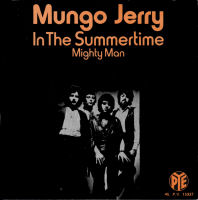
"In the Summertime" is the debut single by British rock band Mungo Jerry, released in 1970. It reached number one in charts around the world, including seven weeks on the UK Singles Chart, two weeks on one of the Canadian charts, and number three on the Billboard Hot 100 singles chart in the US. It became one of the best-selling singles of all-time, eventually selling 30 million copies. Written and composed by the band's lead singer, Ray Dorset, while working in a lab for Timex, the lyrics of the song celebrate the carefree days of summer. The track was included on the second album by the band, Electronically Tested, issued in March 1971.
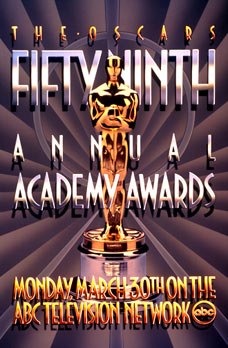
The 59th Academy Awards ceremony, organized by the Academy of Motion Picture Arts and Sciences (AMPAS), took place on March 30, 1987, at the Dorothy Chandler Pavilion in Los Angeles beginning at 6:00 p.m. PST / 9:00 p.m. EST. During the ceremony, AMPAS presented Academy Awards in 23 categories honoring films released in 1986. The ceremony, televised in the United States by ABC, was produced by Samuel Goldwyn Jr. and directed by Marty Pasetta. Actors Chevy Chase, Paul Hogan, and Goldie Hawn co-hosted the show. Hawn hosted the gala for the second time, having previously been a co-host of the 48th ceremony held in 1976. Meanwhile, this was Chase and Hogan's first Oscar-hosting stint. Eight days earlier, in a ceremony held at The Beverly Hilton in Beverly Hills, California, on March 22, the Academy Awards for Technical Achievement were presented by host Catherine Hicks.
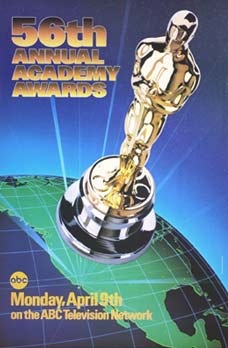
The 56th Academy Awards ceremony, presented by the Academy of Motion Picture Arts and Sciences (AMPAS), honored the best films of 1983 and took place on April 9, 1984, at the Dorothy Chandler Pavilion in Los Angeles, beginning at 6:00 p.m. PST / 9:00 p.m. EST. During the ceremony, AMPAS presented Academy Awards in 22 categories. The ceremony, televised in the United States by ABC, was produced by Jack Haley Jr. and directed by Marty Pasetta. Comedian and talk show emcee Johnny Carson hosted the show for the fifth time. He first presided over the 51st ceremony held in 1979 and last hosted the 54th ceremony held in 1982. Nine days earlier, in a ceremony held at The Beverly Hilton in Beverly Hills, California, on March 31, the Academy Scientific and Technical Awards were presented by hosts Joan Collins and Arnold Schwarzenegger.
The Golden Screen Award, formerly known as the Golden Reel Award, is a Canadian film award, presented to the Canadian film with the biggest box office gross of the year. The Canadian Motion Picture Distributors Association introduced this award in 1976 as part of the Canadian Film Awards until 1979. The Golden Reel became part of the Genie Awards ceremonies in 1980, and is currently part of the Canadian Screen Awards. It was renamed from Golden Reel to Golden Screen as of the 3rd Canadian Screen Awards in 2015.
Joe Hutshing is an American film editor who grew up in San Diego, California and is best known for working multiple times with film director, Oliver Stone and well as with film director Cameron Crowe. Hutshing graduated from the University of Oregon in 1980.
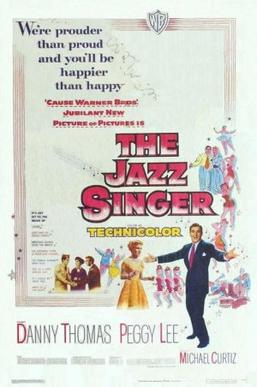
The Jazz Singer is a 1952 remake of the famous 1927 talking picture The Jazz Singer. It stars Danny Thomas, Peggy Lee, and Eduard Franz, and was nominated for an Oscar for best musical score. The film follows about the same storyline as the version starring Al Jolson. It was also distributed by Warner Bros. Pictures.

The Aboriginal Peoples Television Network is a Canadian specialty channel. Established in 1992 and maintained by governmental funding to broadcast in Canada's northern territories, APTN acquired a national broadcast licence in 1999. It airs and produces programs made by, for and about Indigenous peoples in Canada and the United States. Based in Winnipeg, Manitoba, it is the first network by and for North American indigenous peoples.
Nathaniel Arcand is a Canadian actor. He is known for his first major role in the Canadian drama series North of 60, in which for three seasons he played William MacNeil, smart-mouthed and cocky, a troubled, misunderstood teen. In 1997, he was nominated for a Gemini Award in the category "Best Performance by an Actor in a Featured Supporting Role in a Dramatic Series" for the North of 60 episode "Traces and Tracks."

The National Screen Institute – Canada is a non-profit organization headquartered in Winnipeg, Manitoba, Canada. The organization describes itself as "Serving content creators across Canada to tell unforgettable stories through industry-informed training and mentoring."
The Jerry Cans are a band from Iqaluit, Nunavut who combine traditional Inuit throat singing with folk music and country rock. Their music is largely written in Inuktitut, the indigenous language of the Inuit, with lyrics which "reflect the challenges and beauty of life in the Far North". Their 2016 album, Inuusiq/Life, was released on Aakuluk Music, Nunavut's first record label, which the band's members established in 2016 "to support Inuit and Indigenous musicians".

A Beautiful Day in the Neighborhood is a 2019 American biographical drama film on the TV presenter Fred Rogers, directed by Marielle Heller and written by Micah Fitzerman-Blue and Noah Harpster, inspired by the 1998 article "Can You Say ... Hero?" by Tom Junod, published in Esquire. It stars Tom Hanks, Matthew Rhys, Susan Kelechi Watson, and Chris Cooper. It depicts Lloyd Vogel (Rhys), a troubled journalist for Esquire who is assigned to profile television icon Fred Rogers (Hanks).












